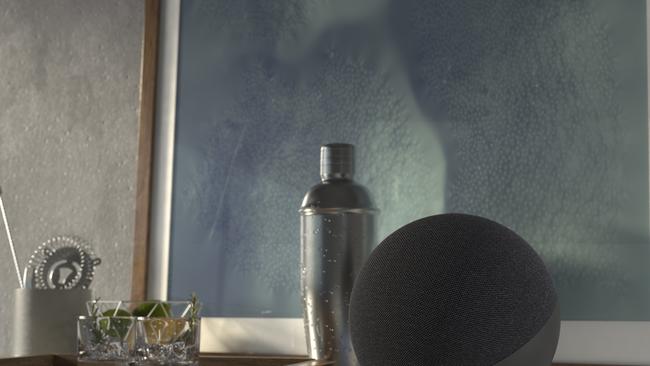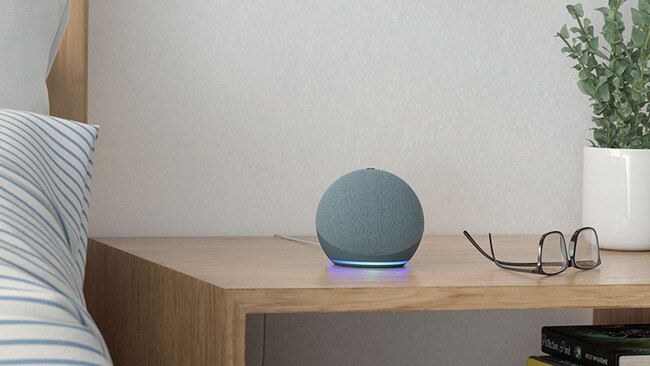2020: The year voice broke out
The era of doing everything ‘at the touch of a button’ is coming to an end in 2020 smart speakers have changed how Australians work, play and relax.

-
-
Amazon Alexa brings hands-free living to your home, to help you entertain, organise, and keep you connected.
It is no secret that the majority of us spend too much time staring at our screens.
Even before the COVID-19 arrived in March, the average Australian was spending three hours and 15 minutes per day staring at their mobile, according to research by RescueTime, one of several apps for iOS and Android created to monitor phone use — a statistic that doesn’t even take into account our daily TV, computer and video game consumption.
As it swept across the country, COVID only exacerbated matters, with daytime internet usage swelling 70-80 per cent between February and April, according to Australia’s National Broadband Network (NBN), much of that bandwidth being delivered directly to our screens.
However, not all internet usage revolves around video, obviously, and one of the most compelling growth stories of this exceptional year has been the rise of smart speakers, such as Amazon’s Alexa.
“We saw really large increases [in adoption and usage], especially when the pandemic first broke out, with people wanting to get regular updates, understanding what the regulations were in their area and how to deal with COVID,” says Kate Burleigh, country manager of Amazon Devices and Alexa Experience. “In our small way we felt pretty proud that Alexa could help people easily get the answers to those very important questions that we all had.”
Over the past few years, the smart speaker boom in Australia has been huge. In fact, Australians are adopting the technology faster than any other country, according to a report by professional services company Cognizant.
“Future generations will no doubt look back on COVID-19 as the moment in history when voice moved from a gradual journey, to a sudden adoption,” says Manish Bahl, an associate vice president at Cognizant. “Voice will trigger a lifetime change in the way we live, work and play.”
Burleigh agrees, noting that the pandemic not only spurred device sales, but also turbocharged the ways in which people interact with them, with steady growth in both the quantity and variety of requests from users, from the serious to the playful.
As the pandemic sent the country into lockdown, one of the greatest areas of growth for Alexa users was entertainment.
“We saw usage move to people looking for entertainment throughout different times of the day because they were home more often,” Burleigh says. “Working from home, people listened to the radio more [...] drive time was replaced with Alexa time.”

In a year of sometimes grim news, people also turned to their voice assistants to lighten the mood by telling them jokes, Burleigh says, “or do something to entertain them just to get them through the day”.
As well as its extensive library of traditional gags, Alexa now responds humorously to more general questions and commands.
Ask Alexa to make you a sandwich and she will reply “Okay, you’re a sandwich”. Tell Alexa you have 99 problems and without missing a beat she says “but a glitch ain’t one.” And if you ask Alexa to be your girlfriend or boyfriend (which, curiously, many people do), you will be told “I like you *pause* as a friend”.
According to Amazon, the increase in users engaging with the funny side of Alexa this year was 271 per cent from March to June when compared to the same period in 2019.
Jokes aside, Alexa has a host of serious skills — the voice equivalent of apps — including setting alarms, defining words, compiling to-do lists, delivering news and weather reports, giving traffic updates, offering meditation sessions, and even taking you through fitness routines. Currently a whopping 25,000 skills are available in Australia.
With people spending more time at home this year, many found ways to use their smart speakers to make their house more liveable.
Smart speakers now interface with a broad range of other smart technologies, such as smart light bulbs, which can not only be turned on and off but also dimmed with voice commands — a handy alternative to having to hire an electrician to rewire your home.
Users can also issue instructions to their TV, locks, thermostat, security cameras, and even their coffee machine and sprinkler system.
One obstacle in the adoption of smart speakers has been consumer concerns about tech privacy. According to a major survey by Capgemini Research last year, half of all respondents said they don’t trust smart speakers with their personal data.
And yet device sales, not only in Australia but around the world, indicate that people have largely overcome their privacy concerns. One reason for this might be because many users were given their smart speaker as a gift, rather than buying it for themselves (at least 50 per cent of UK smart-speaker users were given their device — Australian stats are thought to be similar). Last year smart speakers were one of the most popular Christmas gifts, and 2020 is shaping up to be no different.
The other main reason is the considerable work done to allay people’s privacy concerns. Amazon Alexa gives users the option to delete whatever their smart speaker has recorded, as well as review exactly what their device has heard.
“We really believe that you shouldn’t have to choose between innovation and privacy,” says Burleigh. “What we have been doing over the past year or two has been innovating around privacy so that customers can feel increasingly secure that any requests they have made of Alexa are requests that become private, and requests that they can easily delete or easily access so they can understand what Alexa heard and what she didn’t.”
Some consumers have also expressed concerns about smart speakers’ sustainability.

“In recent research we conducted with owners of smart speakers, 71 per cent of them told us that they consider sustainability and recyclable materials as being important,” Burleigh says. “So I think there is definitely heightened awareness around this area.”
Amazon has addressed such concerns by thinking carefully about everything from the packaging it uses to the materials that go into its speakers’ construction. Considerable effort has also been put into ensuring Alexa spends much of its time in a low-power mode to conserve energy when not in use.
Worries about sustainability have not stood in the way of smart- speaker adoption this year; global sales are expected to be about 161 million, according to market research firm Strategy Analytics — 10 per cent up year on year, despite the trough in the global economy.
Looking ahead, Amazon surveyed Australians as part of its 2020 consumer trends report to discover how important they thought a smart speaker like Alexa will be to the typical household in the years ahead, of which “a resounding 76 per cent agreed she will be a key feature within the home”.
Alexa’s promise to lift us up from our screens and engage directly in the world of our homes, and those we love in them, became more of a reality during COVID. The era of voice is now here.
-
Visit amazon.com.au/meetalexa for more information about how Amazon Alexa can help make your life as easy as possible.
Advertiser content created for Amazon Australia. Read our commercial content guidelines here.
